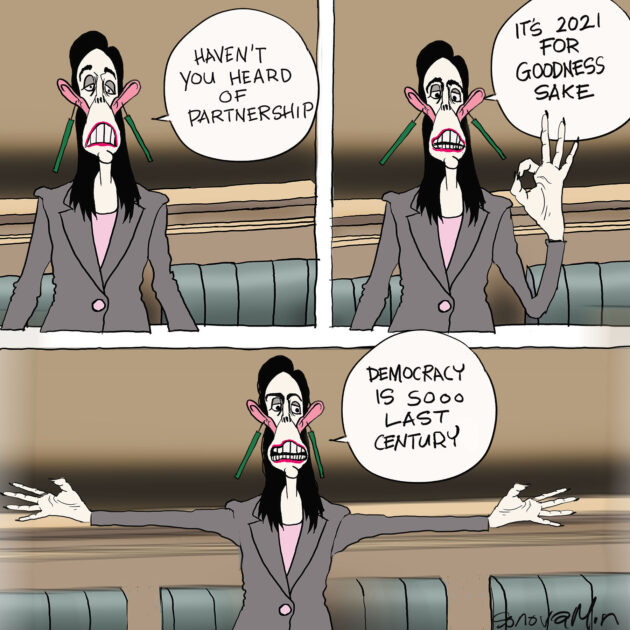Way back in 1960, when I first became active in the National Party by helping its candidate in the Island Bay seat held by Arnold Nordmeyer, I was persuaded to become a regular attender at Regional (then called Divisional) and nationwide (then called Dominion) conferences. The selling point that persuaded me to agree was the excitement of debates on remits: suggestions of new policies and/or amendments to existing policies and laws that would be proposed by branches and, when successful, move up the line to implementation by the party when in government.
And it was true, these debates were the highlights of these two levels of conferences, especially in the next 12 years during the prime ministership of Keith Holyoake, who maintained a continuing firm instruction that the conferences belonged to the party members, and ministers or MPs should speak only when invited or to correct obvious mis-statements of fact. Those were the days when delegates spoke and ministers listened, the opposite of the present day gatherings that pass as “conferences” at which portfolio-holders and MPs speak and delegates are required to listen to rehashed propaganda that is supposed to inspire them.
Those of us who had policy objectives to push, or like me were simply stirrers, used to compete to be heard in rousing debates, especially at Dominion Conferences – which were covered in depth by special programmes each evening on TVNZ. This used to give much more rein to broadcasts of public affairs than the pap served up these days to fill the gaps between advertisements. For us, the success of any conference session was assessed on whether or not we and our arguments had made the TV broadcasts.
This also had the effect of creating competition to be elected as a delegate to such conferences at branch and electorate levels, in turn encouraging people to join the party, which in those days had a strength of over 200,000 members, probably up to 10 times more than today.
So I thought that for today’s column, I’ll write about a remit I will propose to my adopted electorate, Papakura, and summarise the arguments in its favour to be advanced by the mover and seconder if it gets through to the agenda of the next Regional Conference. Here’s the remit:
That the National Party in its manifesto for the next General Election, make a commitment to re-examine the relevance of the Treaty of Waitangi to New Zealand of the 21st century by the launch for discussion and later reference to a binding referendum of a set of Treaty Principles to help to guide all levels of governance in their decisions and actions in our free, democratic and independent sovereign state; and, meantime calls on the government to withhold any further action on He Puapua and re-writing New Zealand history until the obligation to signal changes of this magnitude by pre-election pledges has been honoured.
The covert agenda of the current Ardern-led Labour Government appears to be to do whatever they think it will take to retain office long enough to change our country in the direction of their socialist, state-controlled, “we know best” philosophy of enforced conformity with United Nations globalist domination by a small group of elitists. To achieve this goal means discarding our independent sovereignty and the rights to freedom of speech and thought we have long enjoyed. In turn, this requires two key elements:
- Instilling in the minds of our children a distorted view of our history; and
- Embedding into those minds a deliberate misinterpretation of the Treaty of Waitangi to believe that the framers and signatories of the various copies of that “treaty” regarded it as a “partnership” guaranteeing a 50/50 shared co-governance of New Zealand between Maori and later settlers.
Between us, the mover and seconder of this remit will make the following points:
It is vital that the National Party sends a clear signal to New Zealanders that, upon re-election as Government in 2023 under the leadership of Hon Judith Collins, we will put an immediate stop to these insidious machinations and restore that key principle on which our party was founded in the 1930s: freedom.
In searching for words to support my argument against any attempt to distort history, I found a surprising ally: Emmanuel Macron, President of France and new-found pal of current New Zealand Prime Minister, Jacinda Ardern, through his support for her “Christchurch Call”. Read what President Macron recently told secondary school students in Paris:
“You are not responsible for France’s past, nor are you its guardians. It comes to you as an inheritance, without a testament attached. You may choose to love it; and so too you may choose to criticise it.
“But first of all, you must learn it which means facing it directly and as a whole, imbued with a love of knowledge and resisting the temptation to judge yesterday by today. That is the foremost duty a free people owes to its ancestors who secured the freedoms it enjoys – but it is also a free people’s privilege because it is only by understanding its past it can freely forge its future. And just as those who shred their map are condemned to lose their way, so those who abandon historical truth are condemned to forsake their liberty.”
Hear again these key words: “Resist the temptation to judge yesterday by today.” This is what Ms Ardern and her accomplices want us to do, and they are also using a misinterpretation of the Treaty of Waitangi as a key element of their insidious plot.

After applying a halt to these changes, the very next and simultaneous step to be taken by our newly-elected National Government will be to define in up-to-date terms relevant to this second decade of the 21st century, the principles of the Treaty that should be taken into account in the governance of New Zealand at all levels.
Our suggestion is to launch the national conversation that Opposition Leader Judith Collins has been calling for, by assembling a group of eminent people who have put the hurly-burly of day-to-day political skirmish behind them. People such as Sir Geoffrey Palmer, Jim Bolger, Helen Clark, Richard Prebble and Winston Peters, together with Maori minds such as Sir Wira Gardiner, Dame Naida Glavish, Ngarimu Blair and John Tamihere, under the chairmanship of Sir Anand Satyanand, to draft a set of Treaty Principles for us all to consider, discuss and eventually decide by a binding referendum. Not a replacement of the original historic versions of the Treaty and Te Tiriti with their now admitted differences in perception and interpretation, but a single set of principles, saying the same thing in both languages, to become the means by which governance at all levels can be assured that in their decisions and actions they “honour the treaty”.
Hopefully, I can get this remit all the way to National’s next national conference.
Wanna have your say in keeping our country on track as New Zealand the way we want it? Join the National Party and propose your own remits, or at least have your say in debates about remits proposed by others.
Please share this BFD article so others can discover The BFD.

